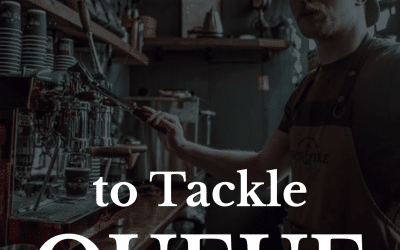If you’re opening a café or upgrading your current setup, one of the biggest decisions you’ll make is which machine will be pulling your espresso shots. Should you go for a commercial espresso machine, or opt for the convenience of a commercial bean to cup coffee machine?
This choice impacts your coffee quality, speed of service, customer satisfaction, and even how your team operates. At Iron & Fire, we’ve worked with cafés of every shape and size, and we’ve seen first-hand how the right (or wrong) decision here can shape a business for years to come.
Let’s break it all down – the pros, cons, maintenance needs, barista skill levels, and cost implications – and help you figure out which machine truly fits your café’s vision.
Spoiler alert: we believe a cafe espresso machine is the gold standard for quality, performance, and reputation. Here’s why…
The Commercial Espresso Machine: Craftsmanship Meets Control
When you walk into a specialty café and see a barista expertly pulling a shot on a gleaming espresso machine, it’s more than theatre. A commercial espresso machine offers the barista total control over every variable – grind size, tamp pressure, extraction time – and that’s where the magic happens.
Pros of Espresso Machines
- Superior Quality
A cafe espresso coffee machine gives baristas control over many different variables, allowing them to fine-tune each shot. This is where true coffee craftsmanship shines. - Brand Credibility
Customers notice when you’ve invested in an espresso machine for coffee shop use. It signals quality, professionalism, and pride in your product. - Menu Flexibility
Want to offer ristretto, long blacks, flat whites, cortados, and everything in between? The best espresso machine lets you create a wide range of drinks with precision. - Consistency With Training
With the right setup and training, a skilled team can deliver cup-after-cup consistency that impresses even the most discerning customers. - Long-Term Durability
A high-quality espresso machine for a coffee business is built to last. We’ve seen machines run smoothly for a decade with proper care and servicing.
Cons of Espresso Machines
- Training Required
Yes, it takes time to train baristas. But once your team is skilled, the return is phenomenal; in both drink quality and customer experience. This is something we at Iron & Fire can help with. - Higher Initial Cost
The best espresso machines for small or large cafés alike will have a higher up-front investment compared to bean-to-cup machines. But when you factor in performance, quality, and brand perception, it’s well worth it.
The Bean-to-Cup Machine: Convenience at a Cost
The commercial bean to cup coffee machine is popular in offices, hotels, and some lower-volume cafés. With one press of a button, it grinds, tamps, brews, and often steams milk all in one go.
Pros of Bean-to-Cup Machines
- Ease of Use
Minimal training is needed. Anyone can press a button and get a drink – no barista skills required. - Speed
In very high-turnover environments like service stations or canteens, speed matters more than finesse. - Compact Design
Some bean to cup commercial coffee machines take up less counter space and don’t require multiple grinders or tamping stations.
Cons of Bean-to-Cup Machines
- Inconsistent Quality
While some models are decent, most can’t compete with a hand-pulled shot from a cafe espresso machine. You lose nuance, control, and the ability to tailor drinks to individual tastes. - Limited Drink Variety
You’re often restricted to the machine’s programming. Want to offer custom milk textures or coffee strength options? You may be out of luck. - Maintenance Complexity
While they seem low-effort, commercial bean to cup coffee machines often require complex cleaning routines and expensive servicing. When they break, repairs can be pricey and slow. - Perception Gap
Customers who care about coffee notice when you’re using automated machines. In a competitive market, that could cost you repeat business.
Maintenance Matters: Know What You’re Getting Into
Espresso Machines
A restaurant espresso machine or café model needs regular cleaning, daily backflushing, and periodic servicing. But the routine is straightforward, and baristas quickly get used to it. Plus, you can often do basic troubleshooting yourself – a huge plus during busy hours.
We’ve had cafés avoid major repair bills for years simply by sticking to a good cleaning and descaling schedule. And when you buy from a trusted supplier, ongoing support is part of the package.
Bean-to-Cup Machines
These machines often require automated cleaning cycles, milk line rinses, and software resets. They may seem easier at first, but you’re often dealing with more moving parts inside a sealed system. If something fails, you can’t just swap out a gasket or adjust a setting. You’re calling the manufacturer and waiting.
Staff Skills: Who’s Behind the Bar?
One big consideration when choosing between an espresso machine for small cafe settings and a bean-to-cup machine is the team behind it.
Espresso Machines
Yes, they require training. But that’s not a downside, it’s an opportunity. Investing in your staff creates a sense of pride, builds consistency, and raises your service standards. Many baristas love the craft and want to grow in their skills. Give them the right tools and watch them thrive.
We trained a small team in Birmingham on the best espresso machine for their coffee shop based on their requirements, and within weeks, their drinks were outperforming their biggest competitors. All it took was the right machine and a bit of time.
Bean-to-Cup Machines
No barista skills? No problem. But also, no edge. If you’re relying entirely on automation, you’re removing the artistry and personality from your drinks, and that can make your café feel forgettable.
Cost Implications: Not Just the Price Tag
While bean-to-cup commercial coffee machines are often cheaper upfront, the long-term costs can add up quickly.
- Maintenance Contracts
Bean-to-cup machines often require expensive servicing plans. - Brand Impact
Customers can tell the difference in quality. A lower price tag today might mean fewer loyal customers tomorrow. - Customisation Limits
If you’re limited in what you can offer, you may miss out on upselling opportunities or creative menu additions.
An espresso machine for cafe use might cost more upfront, but the return – in customer loyalty, higher average transaction values, and reputation – is far greater.
So, Which Machine Is Right for You?
If you’re opening a café that wants to stand out, focus on quality, and build a reputation for great coffee, there’s really no question.
The best espresso machines give you:
- Complete control
- Higher quality drinks
- Greater menu flexibility
- The ability to train a confident, skilled team
A commercial espresso machine becomes the heart of your café, and your baristas become the heartbeat behind it.
On the other hand, if you’re running a hotel buffet, a petrol station café, or a workplace canteen where convenience trumps quality, a commercial bean to cup coffee machine might fit the bill.
- If you want to stand out for quality, build a reputation, and give baristas room to shine, choose an espresso machine.
- If your environment prioritises speed, simplicity, self‑service (e.g., hotel breakfast, office floors, petrol stations), bean‑to‑cup machines can work – if your beans and setup are dialed in by a supplier who understands them.
At Iron & Fire, we support both routes – with one non‑negotiable: the coffee must taste great.
Final Thoughts
Good coffee is about more than convenience. It’s about craft, consistency, and connection. Whether you choose a commercial espresso machine or bean‑to‑cup, partner with a supplier who can profile the right beans, optimise your setup, train your team, and support you long after install.
✅ Machine supply & advice
✅ Beans profiled for espresso or bean‑to‑cup
✅ Training (barista or operator)
✅ Service & support
📞 Ready to choose your machine with confidence?
Book your free machine & coffee consultation →
We’ll help you pick the right path – and make sure every cup does your brand proud.




